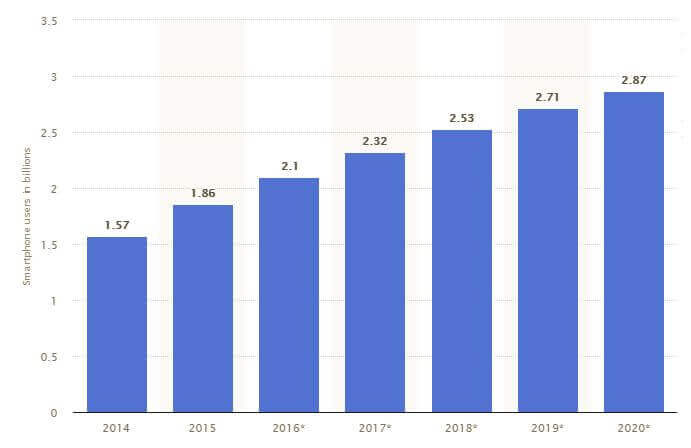
Global smartphone usage topped 2.3bn in 2017. Based on an estimated world population of 7.6bn, that’s over 1 in 3 people who now own one. Usage figures continue to grow steadily, over a decade after the release of the original iPhone, as this chart showing smartphone users (in billions) illustrates;

An incredible 91% of those surveyed in a recent Deloitte Consumer Survey reported using their smartphone at least once within the last 24 hours, making it by far the most ubiquitous device we own. In fact, smartphones are so ingrained within our lives and daily routines that 55% of us check them within 15 minutes of waking and 46% of us check them 15 minutes before going to sleep.
Reversing a trend of miniaturisation, devices (and screens) are now growing in size and practicality, while any initial resistance about using smartphones to purchase online is fading as website developers improve usability, regardless of device. Responsive hotel website design has shifted from being a ‘nice-to-have’ to becoming absolutely essential for those keen to maximise direct bookings.
To better understand smartphone usage and booking trends in the hotel industry, we took time to analyse the data from over 400 four and five star hotels included within our data set, to answer the following questions.
1. What % of Hotel Traffic is Driven by Mobile, Desktop & Tablet?
Across the entire data sample, desktop still edges out mobile in driving the most traffic to the hotel websites we evaluated. However, this varies by property and location and some of our clients are seeing 60%+ of traffic originating on mobile, with tablet traffic remaining fairly flat year-on-year.
2. What % of Hotel Revenue is Driven by Mobile, Desktop & Tablet?
Despite accounting for a significant volume of website traffic, mobile still only accounts for 10.2% of total website revenue across the hotels we evaluated. Again, this figure is growing as the usability of mobile booking engines improves and user confidence in purchasing on smartphone devices increases. These figures lend credence to the widely held industry opinion that smartphones are used more for information search, in the early stages of travel planning.




